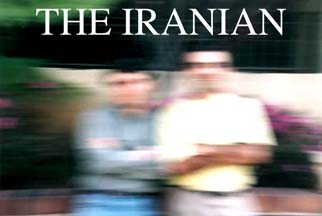Cover story

Aftershock
A book captures the Iranian-American experience
April 19, 1999
The Iranian
 The following are the foreword and selected poems
from "A
World Between: Poems Stories and Essays by Iranian-Americans"
- a collection of writings by 30 authors and poets edited by Persis M.
Karim and Mohammad Mehdi Khorrami (1999, George Braziller Inc., New York;
352 pages).
The following are the foreword and selected poems
from "A
World Between: Poems Stories and Essays by Iranian-Americans"
- a collection of writings by 30 authors and poets edited by Persis M.
Karim and Mohammad Mehdi Khorrami (1999, George Braziller Inc., New York;
352 pages).
* Foreword: Donné Raffat
* Selected poems:
- I
Ain't No American Beauty Rose: Tara Fatemi
- In
Exile: Laleh Khalili
- Hybrid:
Persis M. Karim
- Made
You Mine, America: Ali Zarrin
- Cheshmetun
rowshan:: Arash Saedinia
- I
Pass: Zara Houshmand
- untitled:
Katayoon Zandvakili
- Knowing
about War: Parinaz Eleish
Foreword
Before the Iranian revolution of 1979, when Iran and the United States
were allies, Iranians came to the United States by and large as individuals
for various reasons: to complete their education, to work, and some eventually
to stay. For most, the break with the home country and its culture was
neither definitive nor permanent.
Back then, one could continue living in both worlds, which, in many
ways, seemed complementary. After the revolution, however, this situation
changed dramatically. With the establishment of the Islamic Republic and
the American hostage crisis, the two erstwhile allies became bitter enemies
-- a division that deepened during the Iran-Iraq War (1980-1988), when
the United States tacitly sided with Iraq.
During this first decade of hostility (which still continues), there
occurred a major exodus of Iranians who were dissatisfied with conditions
in their country. For the first time in modern history, there was an Iranian
diaspora, the largest concentration of which settled on the North American
Continent.
For these émigrés and exiles and their offspring, there
was little hope of or point in returning; nor was there a full adjustment
to their adopted homeland, where they were commonly regarded with animosity.
This is the plight of which most of the contributors to this collection
present their experiences and findings.
Most write in the first person, and most are women. Not all, however,
are in the words of one writer, "children of the revolution."
Some left Iran earlier. Nevertheless, for these authors the revolution
and its aftermath constitute the momentous turning point in their lives,
resulting in their displacement.
The voices, as such, are distinctive for their transitional or "transnational"
duality. All here are identifiably Iranian in having Persian as their language
of heritage (although some are more comfortable with Persian than others),
yet also Western in expressing themselves in English. Beyond language,
however, is the deeper pull of their transitional experience and memory,
which are entirely Iranian. hence, the reader is presented with a split,
not a fusion.
Nowhere is there registered a hope that in forgetting or in setting
aside a remembered past there will be a harmonious integration between
the polarized aspects of one's existence and identity. The cure for these
writers is not to leave one culture behind and merge into another, but
rather to tell their stories and to acknowledge their dividedness.
This is the message that one comes away with: where there is blending,
there is difference. Those who see that from their own experience and turn
to writing, in the process contribute to the record of a still unclosed
chapter of human history. As one writer states, "I mourn my past."
The language is English, but the memory and its pain are Iranian.
- Comment to the editors of "A World Between": Persis M. Karim or Mohammad
M. Khorrami
- Comment for The Iranian letters
section


![]()